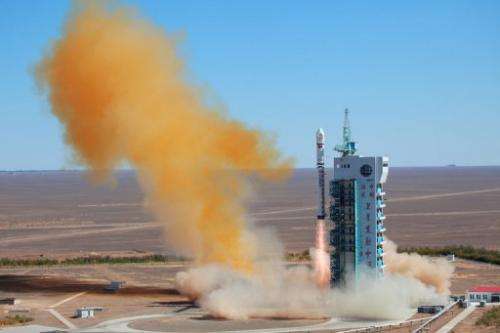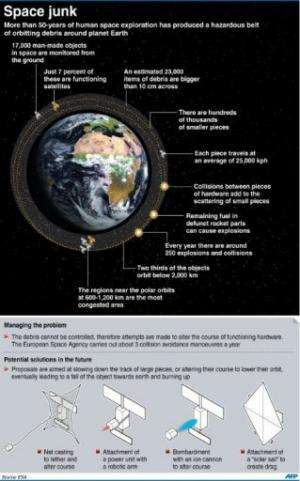This file photo shows a rocket taking off with a satellite, from the remote Gobi desert launch pad in Jiuquan, northwest China's Gansu province, on September 29, 2012. An Ecuadoran satellite launched from the same pad last month could collide with the remains of a Russian rocket in the coming hours, the country's civilian space agency warned.
An Ecuadoran satellite launched last month could collide with the remains of a Russian rocket in the coming hours, the country's civilian space agency warned.
The "Pegaso" (Pegasus) nanosatellite, designed and built in Ecuador, set off aboard an unmanned rocket April 25 from the Jiuquand station in northern China. It is the country's first.
"Alert: possible collision between NEE-01 Pegaso and Russian rocket remains," tweeted the country's civilian space agency, EXA.
Measuring just 10 by 10 by 75 centimeters (four by four by 30 inches), and weighing 1.2 kilograms (2.6 pounds), Pegaso on May 16 transmitted its first live video with audio.
EXA chief Ronnie Nader, Ecuador's first and only astronaut, said the Pegaso could crash with the remains of the Soviet rocket S14 which was launched into space in June 1985.
The two objects could collide at 0538 GMT Thursday at some 1,500 kilometers above the eastern coast of Madagascar.
Graphic on the estimated 23,000 large pieces of debris and defunct space hardward that currently orbit the earth.
Ecuadoran engineers tracking the satellite from the EXA headquarters in the port city of Guayaquil fear that the Pegaso will slam into the S14's fuel tank.
Nader told reporters that they will not be certain of the satellite's fate until 36 to 48 hours after the event.
Nader also said the nanosatellite is insured, but did not say for how much.
Last month's launch came amid much fanfare, including a live broadcast.
The South American country plans to send a second satellite into space from Russia in July.
© 2013 AFP





















